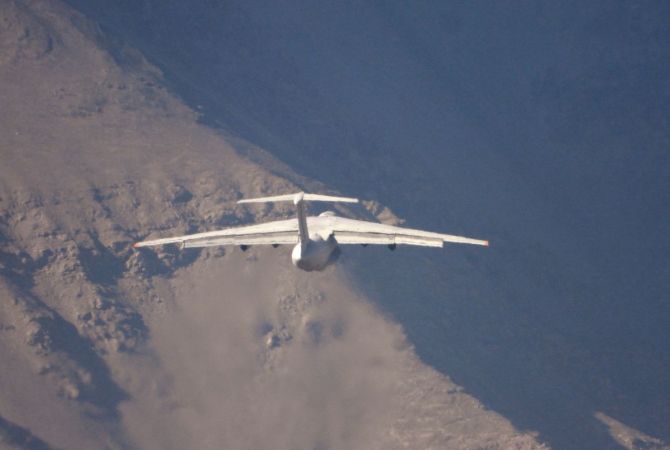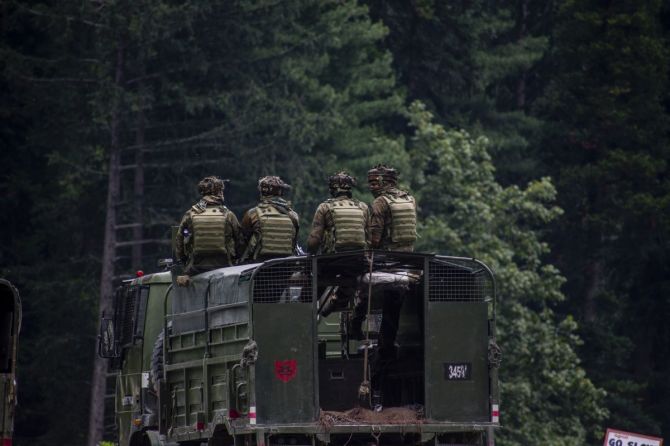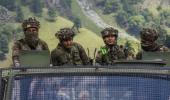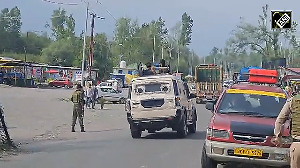'It will be a repeated folly to ever think that China will not attack us.'

"Why is Pakistan opening up fire on the Line of Control and raising levels of violence?"
"It is a two-front strategy built around a two-front war."
Lieutenant General P J S Pannu (retd), former general officer commanding of the Leh-based XIV Corps, discusses the situation on the China border with Rediff.com's Archana Masih .
India and China haven't seen such a deployment since 1962. What are its implications as things stand?
Both countries went to war nearly 60 years ago. The Chinese perception then was proved right that India was a weak country which could not defend its borders.
Our troops were neither prepared for the winters, nor well equipped to fight. They did not have winter clothing, equipment or techniques of fighting winter warfare.
Secondly, there was a background of trust and friendship between India and China. India never expected an attack from China which was a folly.
Today, we are in eyeball-to-eyeball contact. It will be a repeated folly to ever think that China will not attack us.
Therefore, it is important for the Indian Army and India as a nation to prepare for war.
Do you see extended periods of tension? Are we likely to see some sort of further escalation keeping the winter in mind?
There is going to be a prolonged tension and prolonged deployment.
Xi Jinping and the Chinese Communist party have convinced their nation that they are invincible. If they back down it would diminish them in the eyes of their own people.
Xi has convinced his people that during his term as president, China will race ahead in the world and occupy the position of power they think they deserve -- as the Middle Kingdom.
Any backing down by Xi would run contrary to the dreams he has been selling his own people.
There is no exit available to him.
Even in virtual conferences like BRICS, Xi Jinping would still want to look big enough to save his own face in such meetings.
As a result, he might put on a facade of being a superpower and continue to do so for as long as he is proven otherwise, by the play of things in the world.
When you say Xi's feet are tied, then what is the possibility of going back to the status quo ante that existed pre-April 2020? Is that becoming increasingly difficult?
The Chinese will have to create another significant event which makes the current problem look relatively smaller. Then they might sell that as a larger cause and look charitable asking India to come together as part of larger humanity to rebuild the world.
They will emphasise on global trade and refrain from talking about the border so that the India-China border problem goes onto the back-burner and the attention of the word is diverted.
Xi might then slowly come to a conclusion to wind up and get his troops back into barracks and continue to patrol the contentious areas.
He would want to create a diversionary situation, but China is certainly making yet another mistake by trying to support or maybe prop up certain other countries to interfere with destructive disruption.
Xi is also trying to create a situation in Pakistan.
Why would Pakistan minister Fawad Chaudhry make a statement in their parliament, giving credit for the Pulwama attack to the prime minister of Pakistan?
Why is Pakistan opening up fire on the Line of Control and raising levels of violence?
I think it is the Chinese who are asking the Pakistanis to start making these provocative statements which forces Indians to respond.
The aggression on the LoC is aimed to create a situation to divert India's attention to Pakistan and provide an opportunity to China to attack distracted India again.
It is a two-front strategy built around a two-front war or two-front jockeying around so that the pressure is released from the northern borders or create another dimension altogether in which the current military standoff looks secondary.
I think those are the strategies and tactics the Chinese might largely adopt.

We have to be prepared for a two-front war?
We must be prepared for two fronts.
We have to be mindful of the implications of the Malabar exercises in the Arabian Sea where both American and Indian aircraft carriers are participating along with the navies of Australia and Japan.
India must also be watchful about the reaction from Chinese bases in Djibouti and Pakistani Gwadar where they may have placed their warships.
Malabar is not only signalling, but also a practice. I would call it signalling if there were no agreements with the American, but our agreements are in place and some of them have also fructified.
India has expanded its defence and diplomatic relations with America. Do you think that can be perceived as India being seen as an ally of the United States. As a country known to have its own mind, does that pose any disadvantages?
When you see the Quad which was only an understanding earlier that too at conceptual level rather than a military alliance, the coming together of our navies for exercises, the 2+2 meetings, the number of agreements that have already been signed, such as COMCASA, LEMOA and BECA have changed the complexion of the relationship.
These indicate seriousness and possibilities of coming together militarily, delivery of military equipment component has commenced -- all this shows that our ability to operate and cooperate with American troops is on the rise.
I think this is enough evidence to forewarn China because whatever is being done now is China-centric, not world-centric.
But the problem with alliances sometimes is that friends or enemies of one nation can be imposed on the other nation -- certain interests can get compromised.
I think India would not lose its strategic autonomy. It has taken quite a while for the Indians and Americans to come to the stage of signing agreements.
It has not happened overnight, but has been going on from the late 1990s when we started talking about the Malabar exercises and a strategic partnership.
In 2005, we started conducting more exercises including Special Forces, Infantry, Air force and Navy such as Malabar which is a flagship exercise. Western equipment and manoeuvres have been included.
We naturally became closer partners also because we speak the same language -- English -- which makes us more communicable with the Americans than some other countries.
The Indo-Pacific has become a region of cooperation. The open seas is going to be the basis for foreign powers to become military partners at will because there is freedom of movement, and aircraft carriers provide platforms to fire missiles deep into the opponent's territory.
The BECA agreement provides access to not only geospatial information, but can also be used for precise live engagement of adversaries targets.
Hence, the edge which China earlier enjoyed over India in design technology and its ability to strike deep with precision has now been overcome by making collaborative arrangements with US.
India has a good missile programme which has only become more potent with the BECA agreements.

It has been seven months of the continuing standoff, does this mean we have to be prepared for the long haul?
When Indian troops went into the Siachen glacier, we never thought that they would stay there for very long. It has been 36 years and we are still there.
Indians troops have been holding the Kargil heights for more than 20 years now.
Our troops rotate and every battalion has the experience of fighting high altitude warfare in Kargil, Siachen, Arunachal Pradesh and Ladakh on the Line of Control and the Line of Actual Control. Our troops are adept at fighting in super high altitudes.
If they now have to fight in the same environment against the Chinese, so be it, but for the Chinese it is a new ballgame altogether.
If the Chinese use any technology, the world's technology will come and hover around the Tibetan plateau.
The world should also start looking at Tibet as a disputed region. If the Chinese have brought in the kind of forces into Tibet region, it means that the feeble voice of independence and autonomy, which the Chinese want to crush will only become more pronounced.
The Chinese will risk disintegration if they continue to claim islands and gobble up more territory, which is claimed or disputed.
If they want to go and dominate the illegitimate and term it legitimate through the One China policy, well, I think the cycle can be reversed by calling 'everything that they claim under the One China policy illegitimate'.
Feature Presentation: Aslam Hunani/Rediff.com











 © 2025
© 2025